
Lychee is a free photo-management tool, which runs on your server or web-space. Installing is a matter of seconds. Upload, manage and share photos like from a native application. Lychee comes with everything you need and all your photos are stored securely. In this step by step guide I will show you how to install Lychee on your Synology NAS using Docker and Portainer.
This guide works perfectly with the latest Lychee v6.7.0 release.
STEP 1
Please Support My work by Making a Donation.
STEP 2
Install Portainer using my step by step guide. If you already have Portainer installed on your Synology NAS, skip this STEP. Attention: Make sure you have installed the latest Portainer version.
STEP 3
Make sure you have a synology.me Wildcard Certificate. Follow my guide to get a Wildcard Certificate. If you already have a synology.me Wildcard certificate, skip this STEP.
STEP 4
Go to Control Panel / Login Portal / Advanced Tab / click Reverse Proxy. Follow the instructions in the image below.
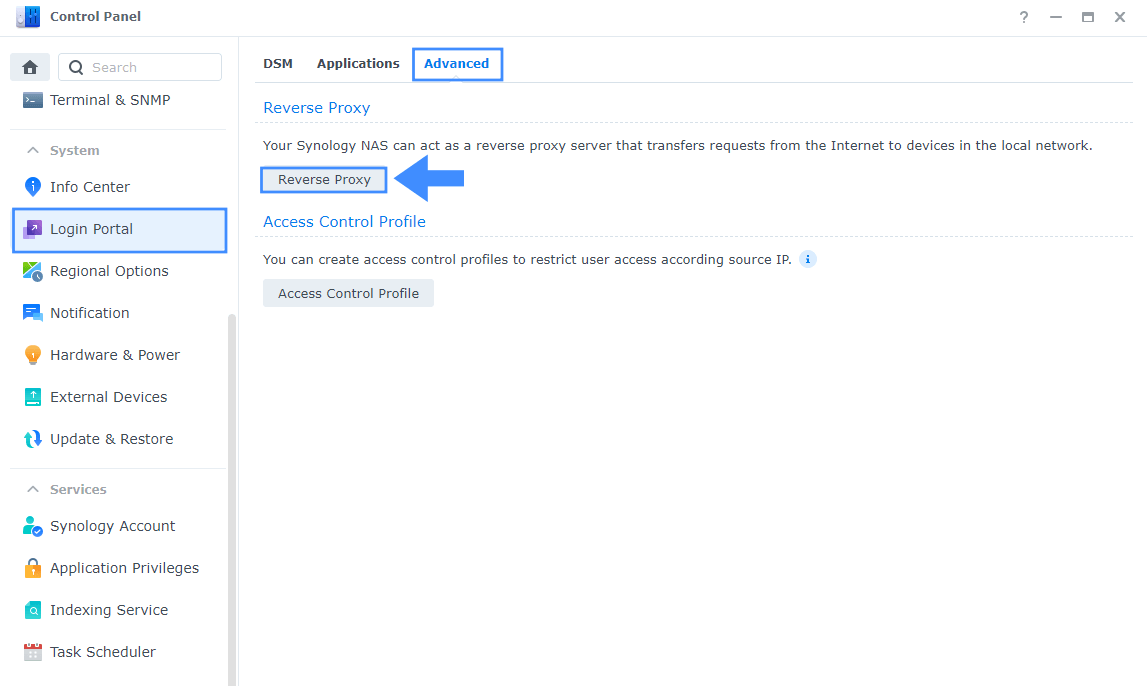
STEP 5
Now click the “Create” button. Follow the instructions in the image below.
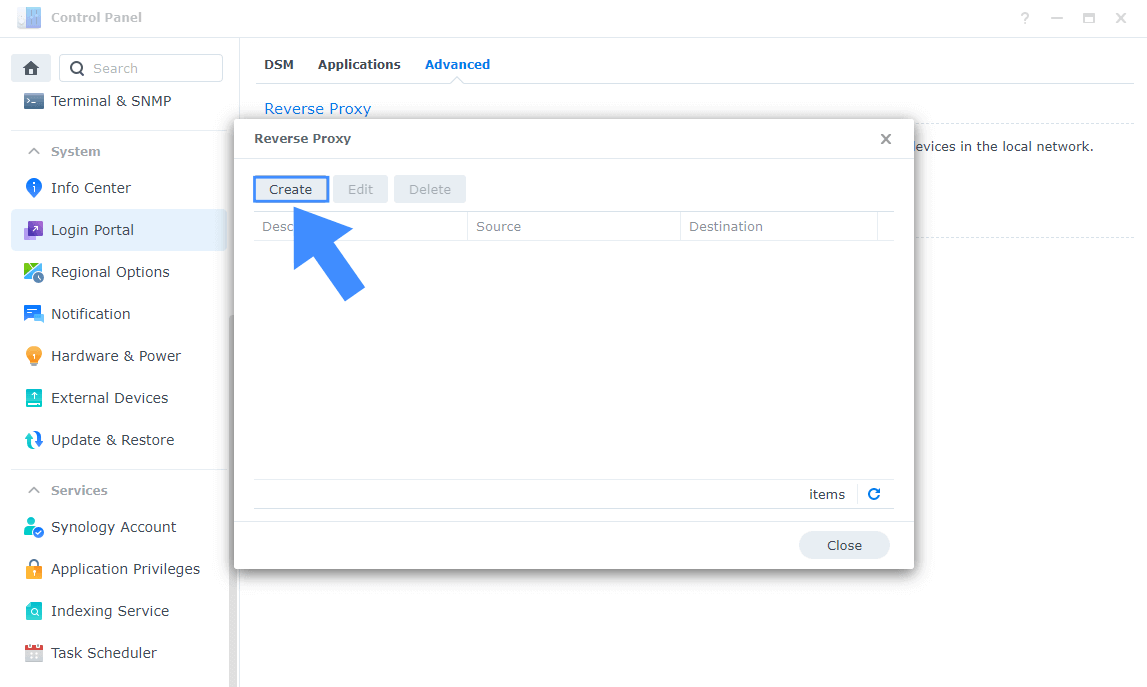
STEP 6
After you click the Create button, the window below will open. Follow the instructions in the image below.
On the General area, set the Reverse Proxy Name description: type in Lychee. After that, add the following instructions:
Source:
Protocol: HTTPS
Hostname: lychee.yourname.synology.me
Port: 443
Check Enable HSTS
Destination:
Protocol: HTTP
Hostname: localhost
Port: 6280
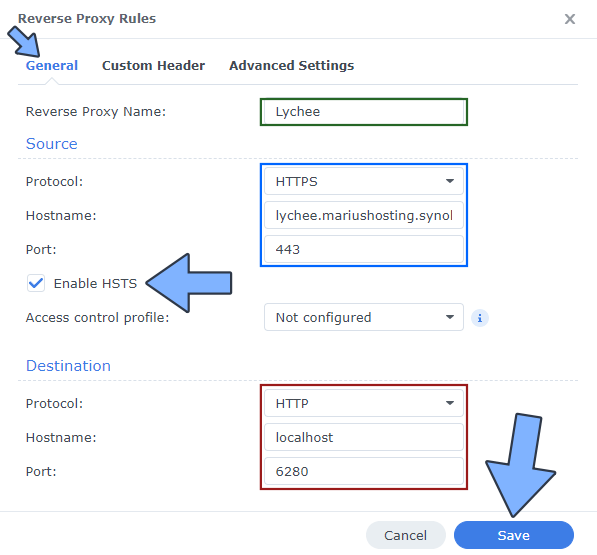
STEP 7
On the Reverse Proxy Rules click the Custom Header tab. Click Create and then, from the drop-down menu, click WebSocket. After you click on WebSocket, two Header Names and two Values will be automatically added. Click Save. Follow the instructions in the image below.

STEP 8
Go to Control Panel / Network / Connectivity tab/ Check Enable HTTP/2 then click Apply. Follow the instructions in the image below.
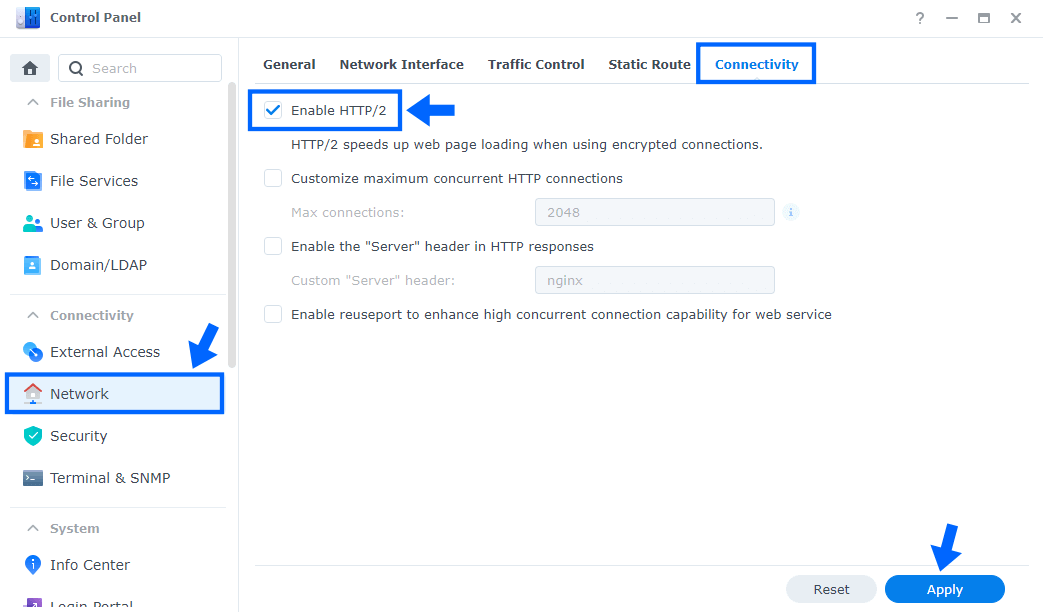
STEP 9
Go to Control Panel / Security / Advanced tab/ Check Enable HTTP Compression then click Apply. Follow the instructions in the image below.
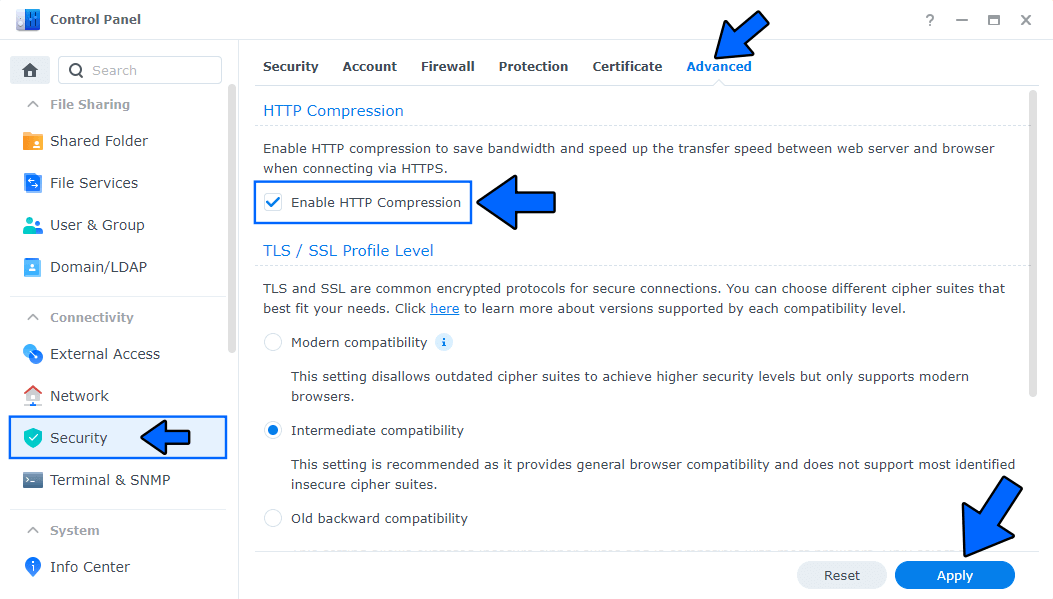
STEP 10
Go to File Station and open the docker folder. Inside the docker folder, create one new folder and name it lychee. Follow the instructions in the image below.
Note: Be careful to enter only lowercase, not uppercase letters.
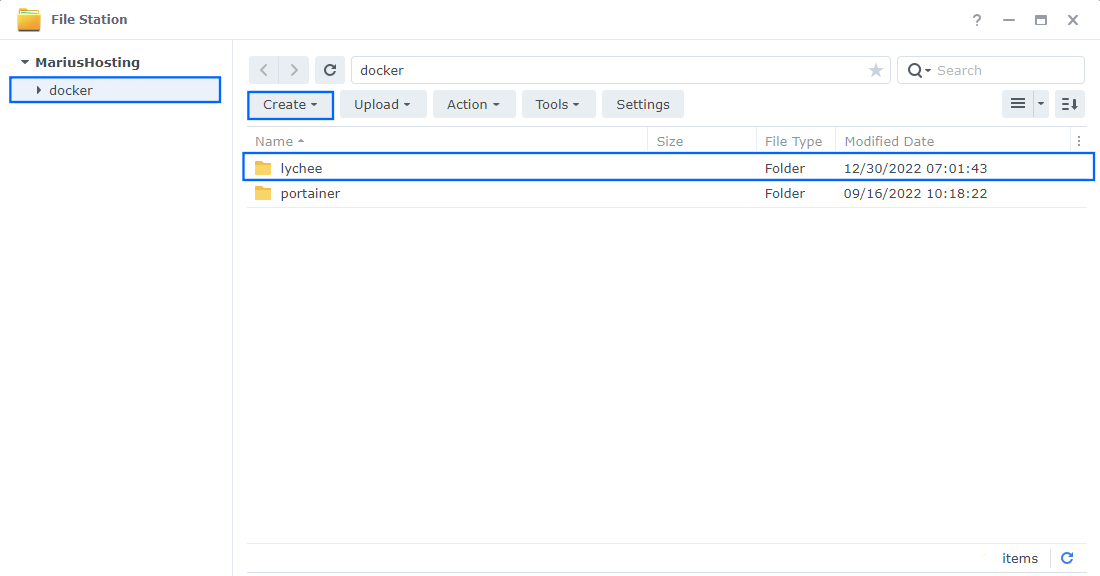
STEP 11
Now create seven new folders inside the lychee folder that you have previously created at STEP 10 and name them conf, db, logs, redis, sym, tmp, uploads. Follow the instructions in the image below.
Note: Be careful to enter only lowercase, not uppercase letters.
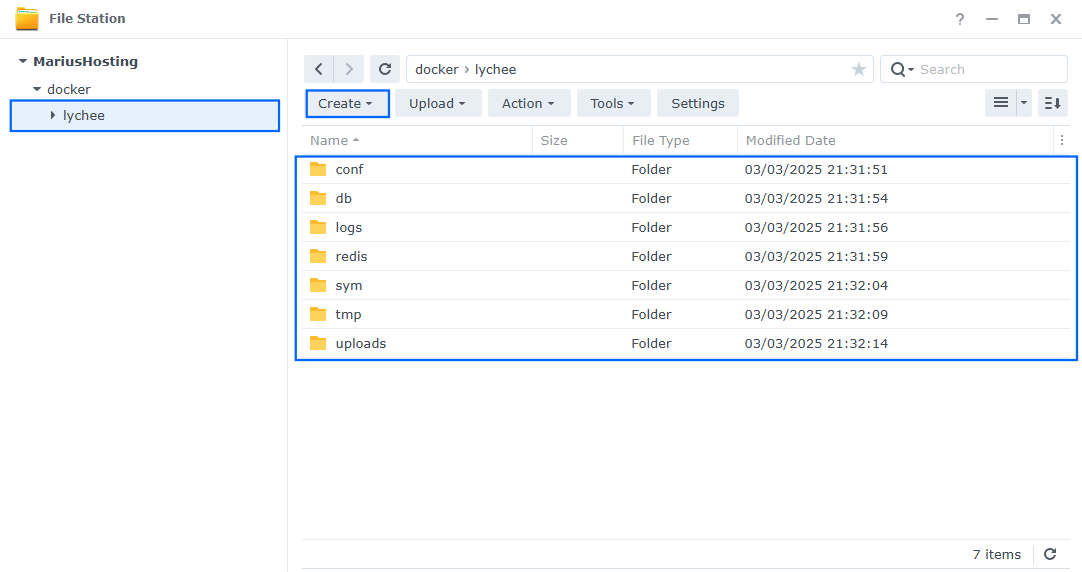
STEP 12
Log into Portainer using your username and password. On the left sidebar in Portainer, click on Stacks then + Add stack. Follow the instructions in the image below.
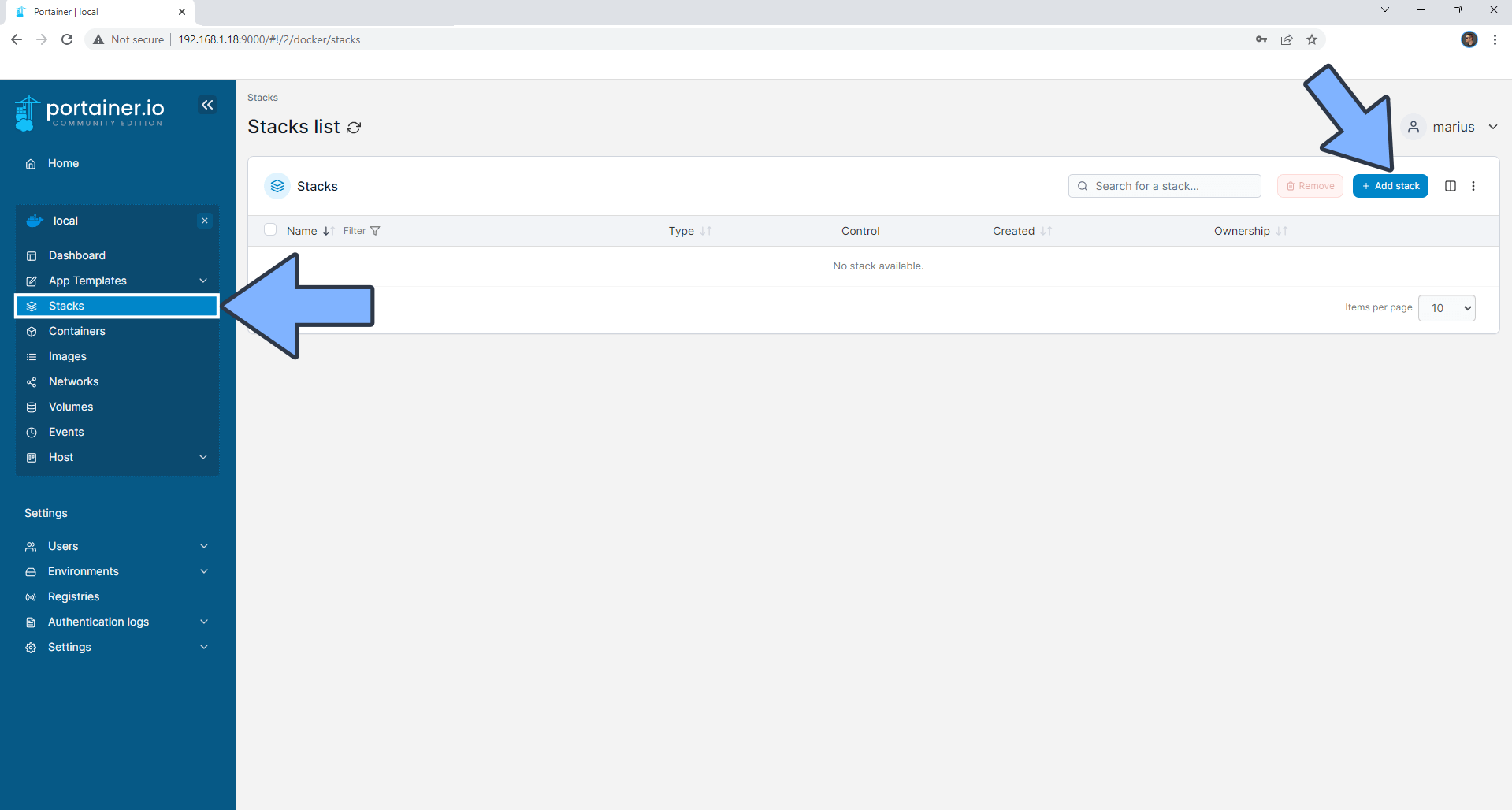
STEP 13
In the Name field type in lychee. Follow the instructions in the image below.
services:
db:
image: mariadb:11.4-noble #LTS Long Time Support Until May 29, 2029.
container_name: Lychee-DB
hostname: lychee-db
security_opt:
- no-new-privileges:false
environment:
- TZ=Europe/Bucharest
- MYSQL_ROOT_PASSWORD=rootpass
- MYSQL_DATABASE=lychee
- MYSQL_USER=lycheeuser
- MYSQL_PASSWORD=lycheepass
volumes:
- /volume1/docker/lychee/db:/var/lib/mysql:rw
ports:
- 3306:3306
restart: on-failure:5
redis:
image: redis
hostname: lychee-redis
command: redis-server --requirepass redispass
container_name: Lychee-REDIS
user: 1026:100
healthcheck:
test: ["CMD-SHELL", "redis-cli ping || exit 1"]
volumes:
- /volume1/docker/lychee/redis:/data:rw
environment:
TZ: Europe/Bucharest
restart: on-failure:5
lychee:
image: lycheeorg/lychee:latest
container_name: Lychee
hostname: lychee
security_opt:
- no-new-privileges:false
healthcheck:
test: curl -f -s http://localhost:80/ || exit 1
volumes:
- /volume1/docker/lychee/conf:/conf:rw
- /volume1/docker/lychee/uploads:/uploads:rw
- /volume1/docker/lychee/sym:/sym:rw
- /volume1/docker/lychee/logs:/logs:rw
- /volume1/docker/lychee/tmp:/lychee-tmp:rw
environment:
- PUID=1026
- PGID=100
- PHP_TZ=Europe/Bucharest
- TIMEZONE=Europe/Bucharest
- APP_FORCE_HTTPS=true
- APP_ENV=production
- DB_CONNECTION=mysql
- DB_HOST=lychee-db
- DB_PORT=3306
- REDIS_PORT=6379
- CACHE_DRIVER=file
- REDIS_HOST=lychee-redis
- REDIS_PASSWORD=redispass
- DB_DATABASE=lychee
- DB_USERNAME=lycheeuser
- DB_PASSWORD=lycheepass
- STARTUP_DELAY=10
- APP_NAME=Laravel
- APP_DEBUG=false
- APP_URL=https://lychee.yourname.synology.me
- APP_KEY=base64:PqkYgeKqq3hdHZTvL6ENXdhgyyoCDZYj9wofOcw0l4o=
- TRUSTED_PROXIES=*
- SECURITY_HEADER_HSTS_ENABLE=true
#- MAIL_DRIVER=smtp
#- MAIL_HOST=smtp.gmail.com
#- MAIL_PORT=587
#- MAIL_USERNAME=Your-own-gmail-address
#- MAIL_PASSWORD=Your-own-gmail-address
#- MAIL_ENCRYPTION=starttls
#- MAIL_FROM_NAME=Your-own-gmail-address
#- MAIL_FROM_ADDRESS=Your-own-app-password
ports:
- 6280:80
restart: on-failure:5
depends_on:
db:
condition: service_started
Note: Before you paste the code above in the Web editor area below, change the value for TZ. (Select your current Time Zone from this list.)
Note: Before you paste the code above in the Web editor area below, change the value numbers for PUID and PGID with your own values. (Follow my step by step guide on how to do this.) 1026 is my personal PUID value and 100 is my personal PGID value. You have to type in your own values.
Note: Before you paste the code above in the Web editor area below, change the value for PHP_TZ. (Select your current Time Zone from this list.)
Note: Before you paste the code above in the Web editor area below, change the value for TIMEZONE. (Select your current Time Zone from this list.)
Note: Before you paste the code above in the Web editor area below, change the value for APP_URL and type in your own synology.me DDNS with https:// at the beginning that you have previously created at STEP 6.
Note: Before you paste the code above in the Web editor area below, change the value for APP_KEY. (Generate your own free APP KEY.)
Note: If you want, you can also add your own SMTP email details by removing all the # in the code above. If you don’t have SMTP details, then leave the code as it is with the #. (Follow my guide on how to Activate Gmail SMTP For Docker Containers.)
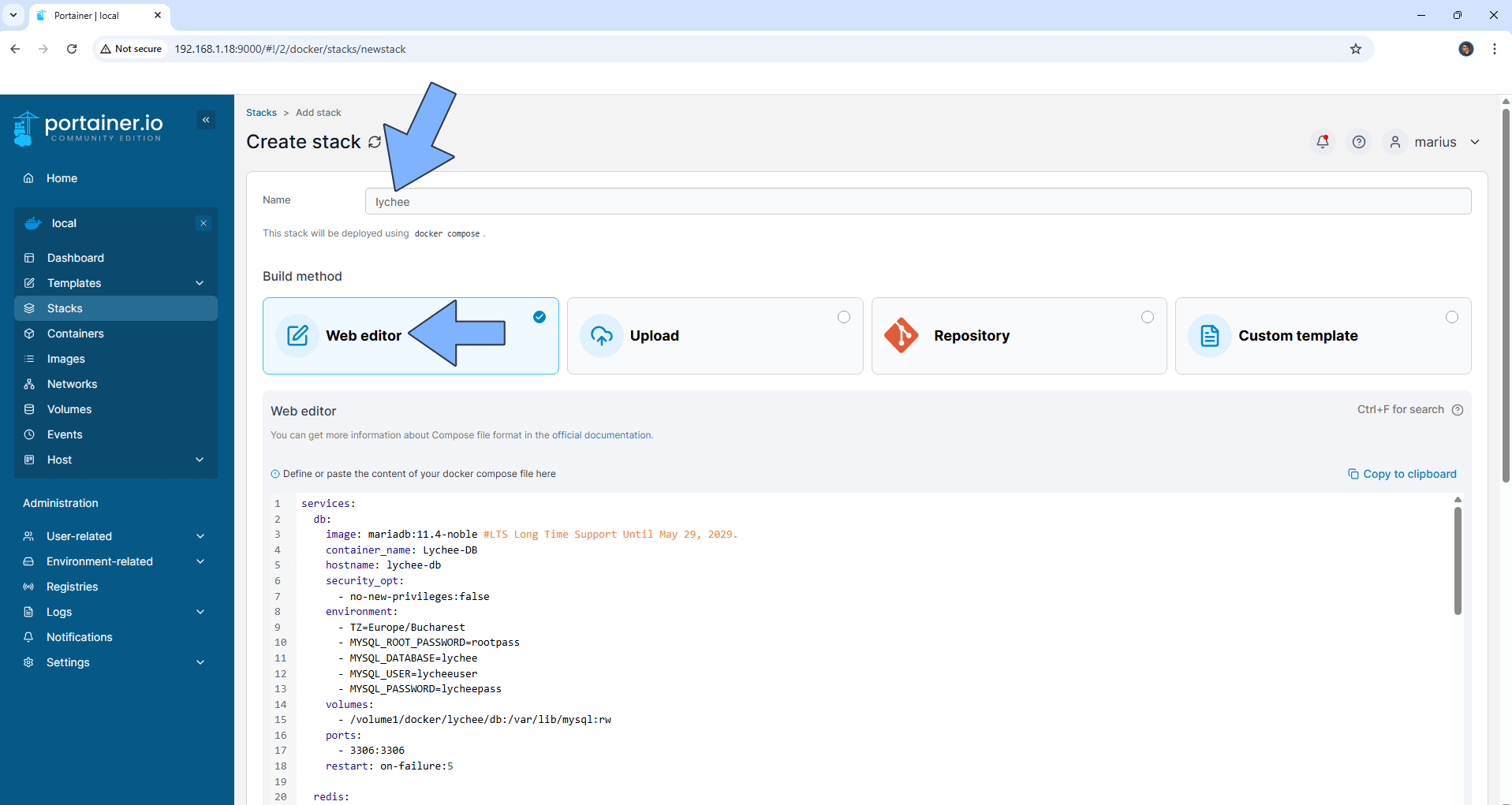
STEP 14
Scroll down on the page until you see a button named Deploy the stack. Click on it. Follow the instructions in the image below. The installation process can take up to a few minutes. It will depend on your Internet speed connection.
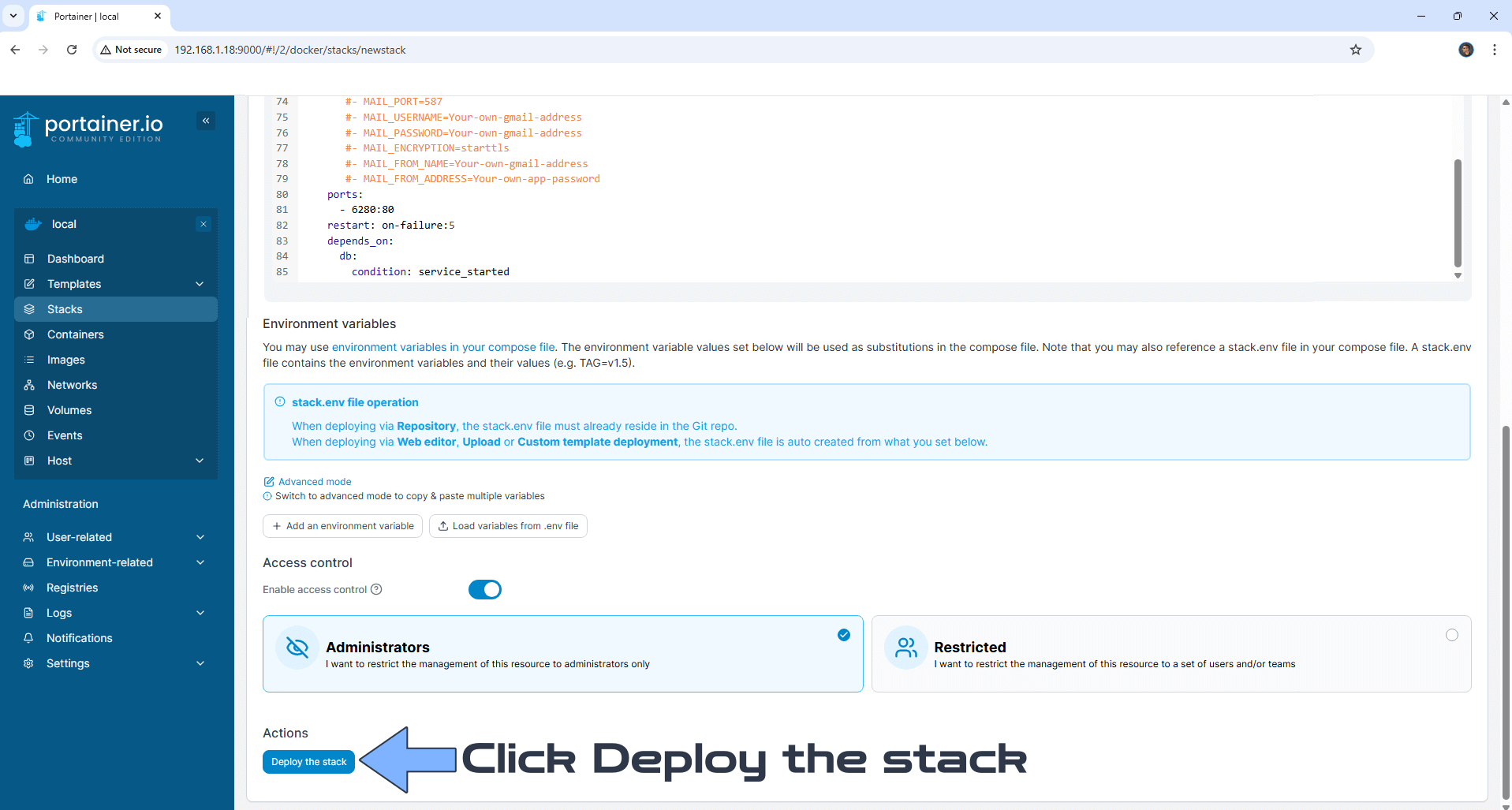
STEP 15
If everything goes right, you will see the following message at the top right of your screen: “Success Stack successfully deployed“.
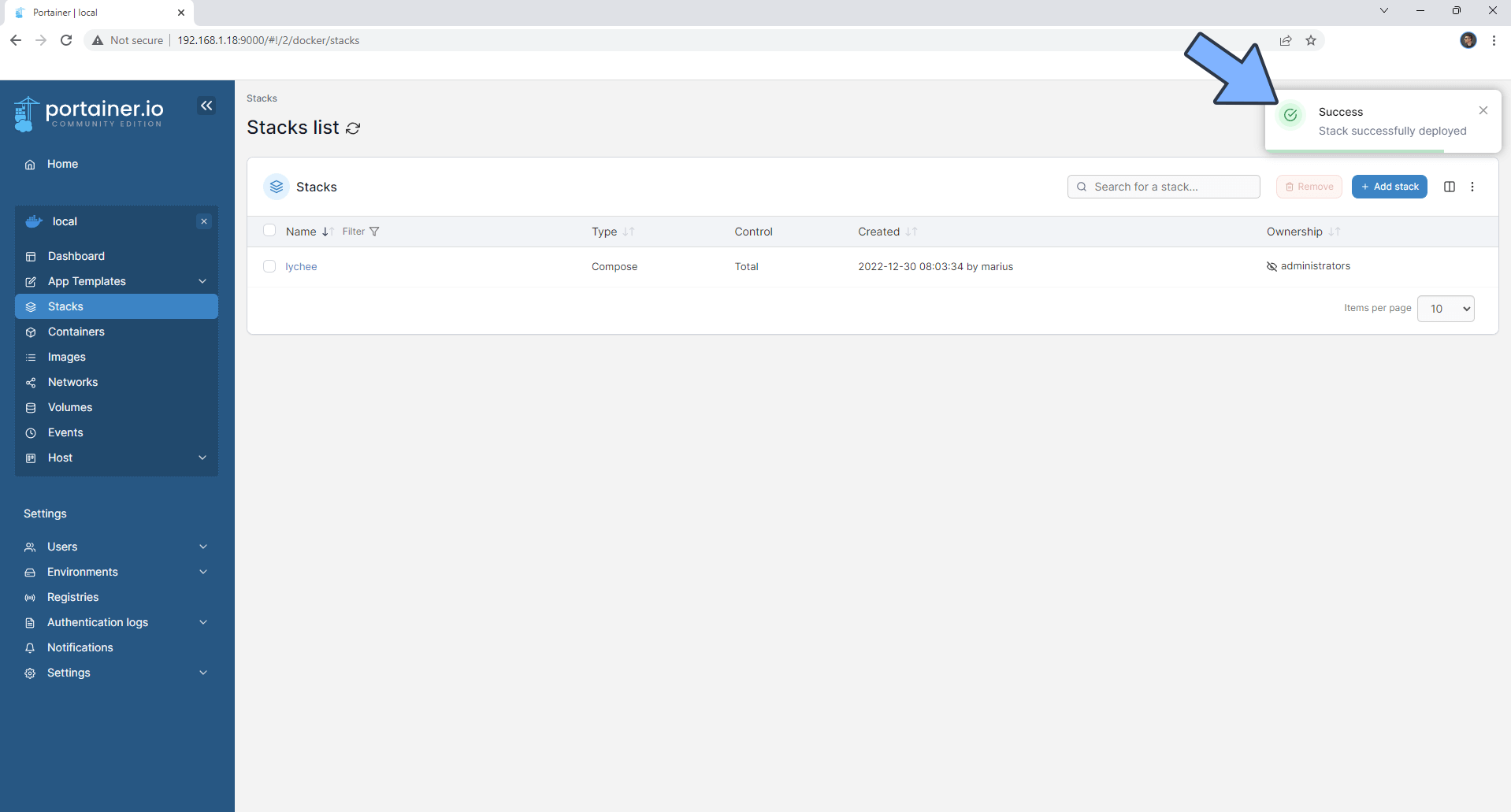
STEP 16
🟢Please Support My work by Making a Donation. Almost 99,9% of the people that install something using my guides forget to support my work, or just ignore STEP 1. I’ve been very honest about this aspect of my work since the beginning: I don’t run any ADS, I don’t require subscriptions, paid or otherwise, I don’t collect IPs, emails, and I don’t have any referral links from Amazon or other merchants. I also don’t have any POP-UPs or COOKIES. I have repeatedly been told over the years how much I have contributed to the community. It’s something I love doing and have been honest about my passion since the beginning. But I also Need The Community to Support me Back to be able to continue doing this work.
STEP 17
Please wait approximately 5 minutes for the installation to be completed or you will get a blank Synology page if you try to connect too soon. Now open your browser and type in your HTTPS/SSL certificate like this https://lychee.yourname.synology.me In my case it’s https://lychee.mariushosting.synology.me If everything goes right, you will see the Lychee installation page. Click Next. Follow the instructions in the image below.
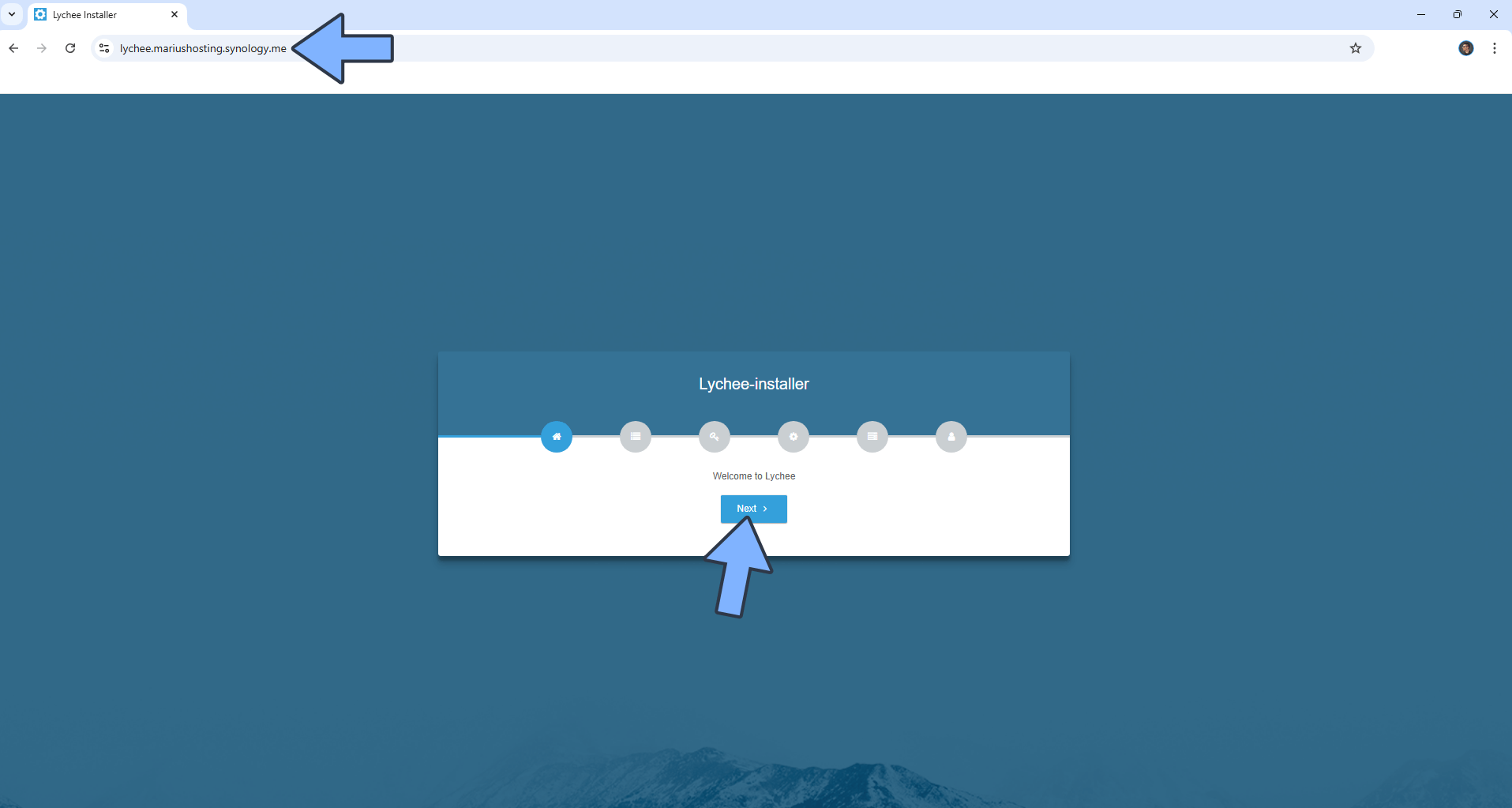
STEP 18
Click Next. Follow the instructions in the image below.
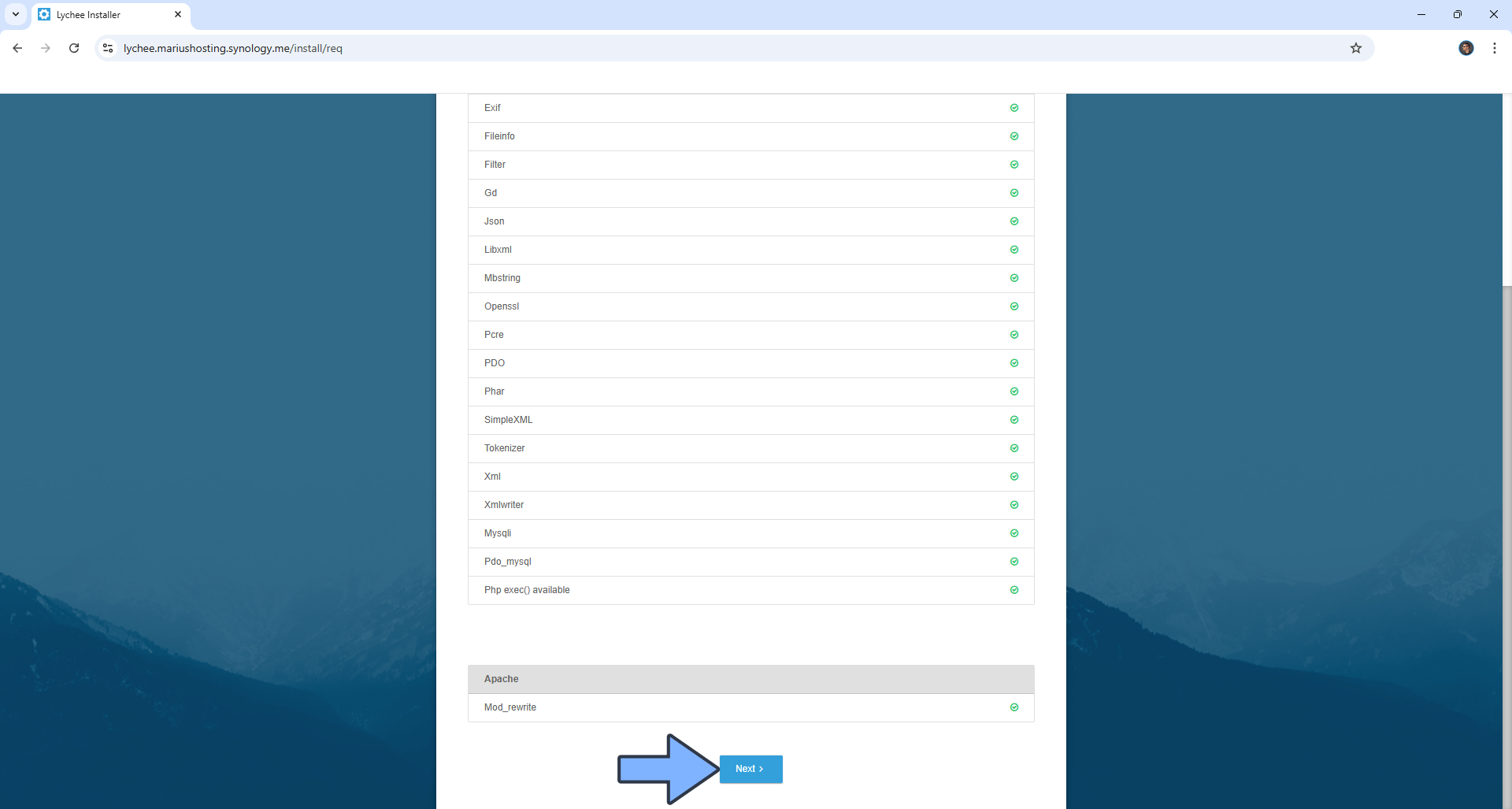
STEP 19
Click Next. Follow the instructions in the image below.
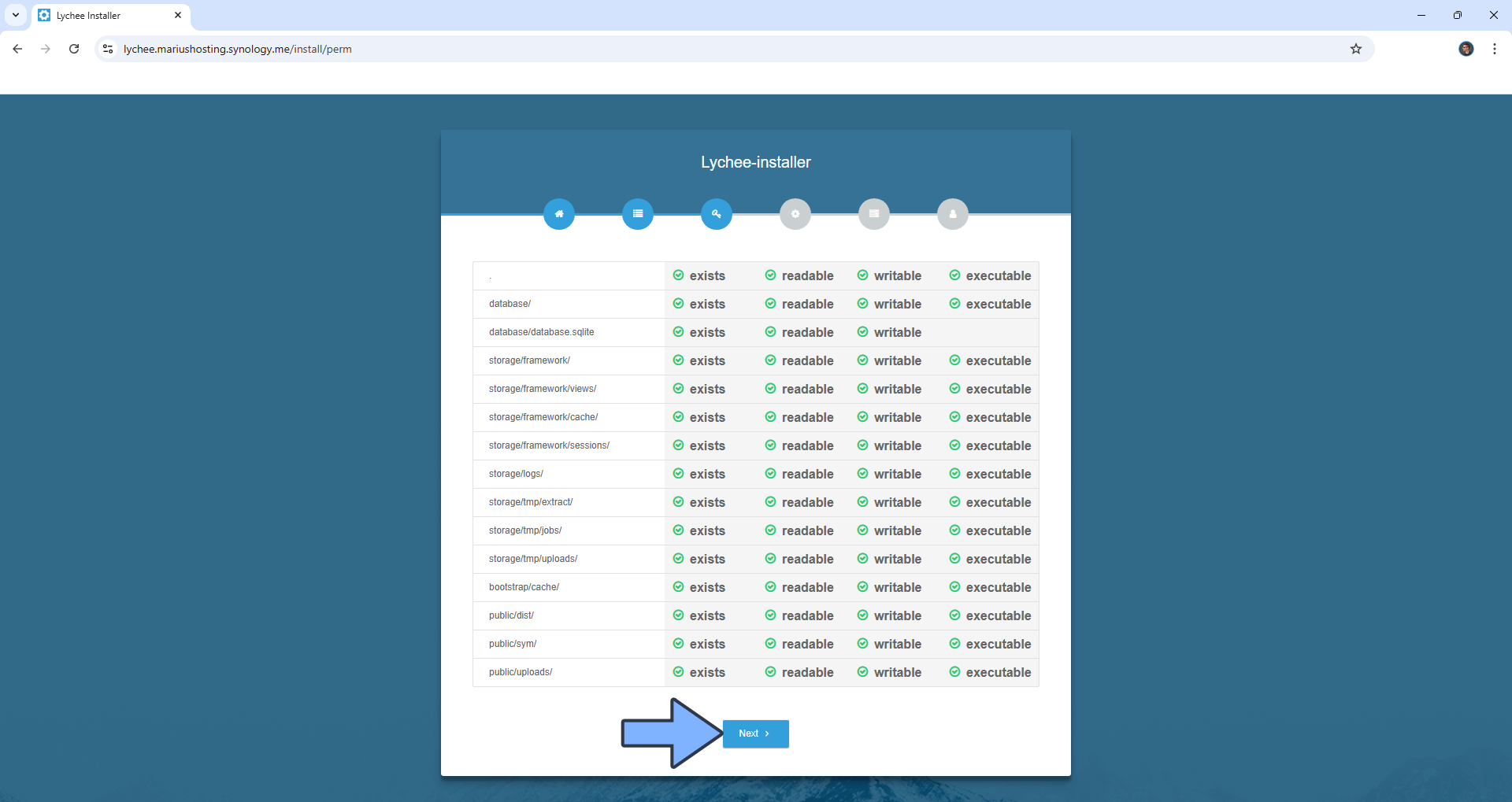
STEP 20
Click Install. Follow the instructions in the image below.
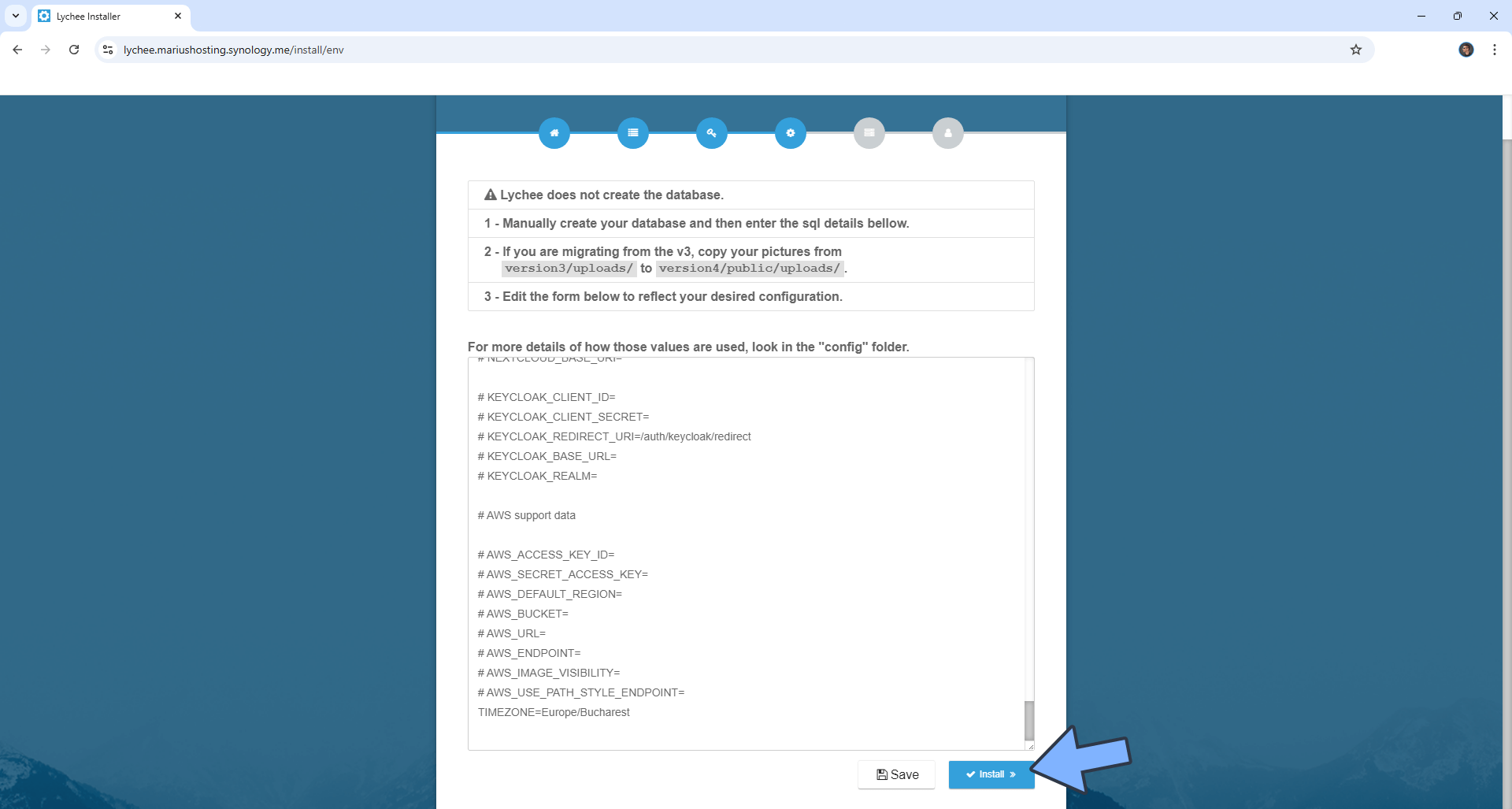
STEP 21
Wait some minutes for the installation to be completed. If you get an error, just refresh your page and go to the following link: https://lychee.yourname.synology.me/install/admin
STEP 22
Click Set up admin account. Follow the instructions in the image below. Note: Go straight to the next step if you don’t see this part.
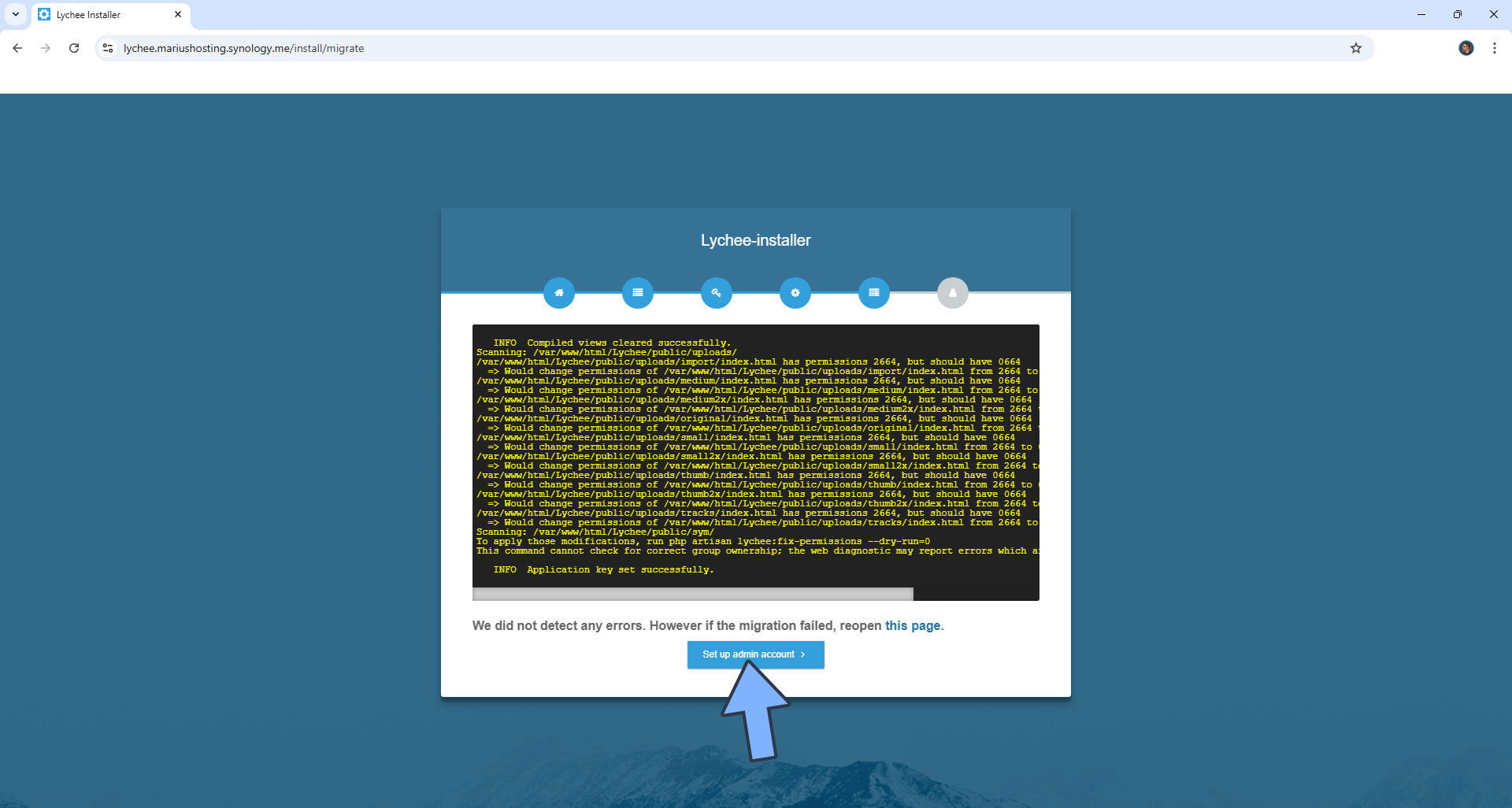
STEP 23
Type in your own Username and Password. Confirm the password then click Create admin account. Follow the instructions in the image below.
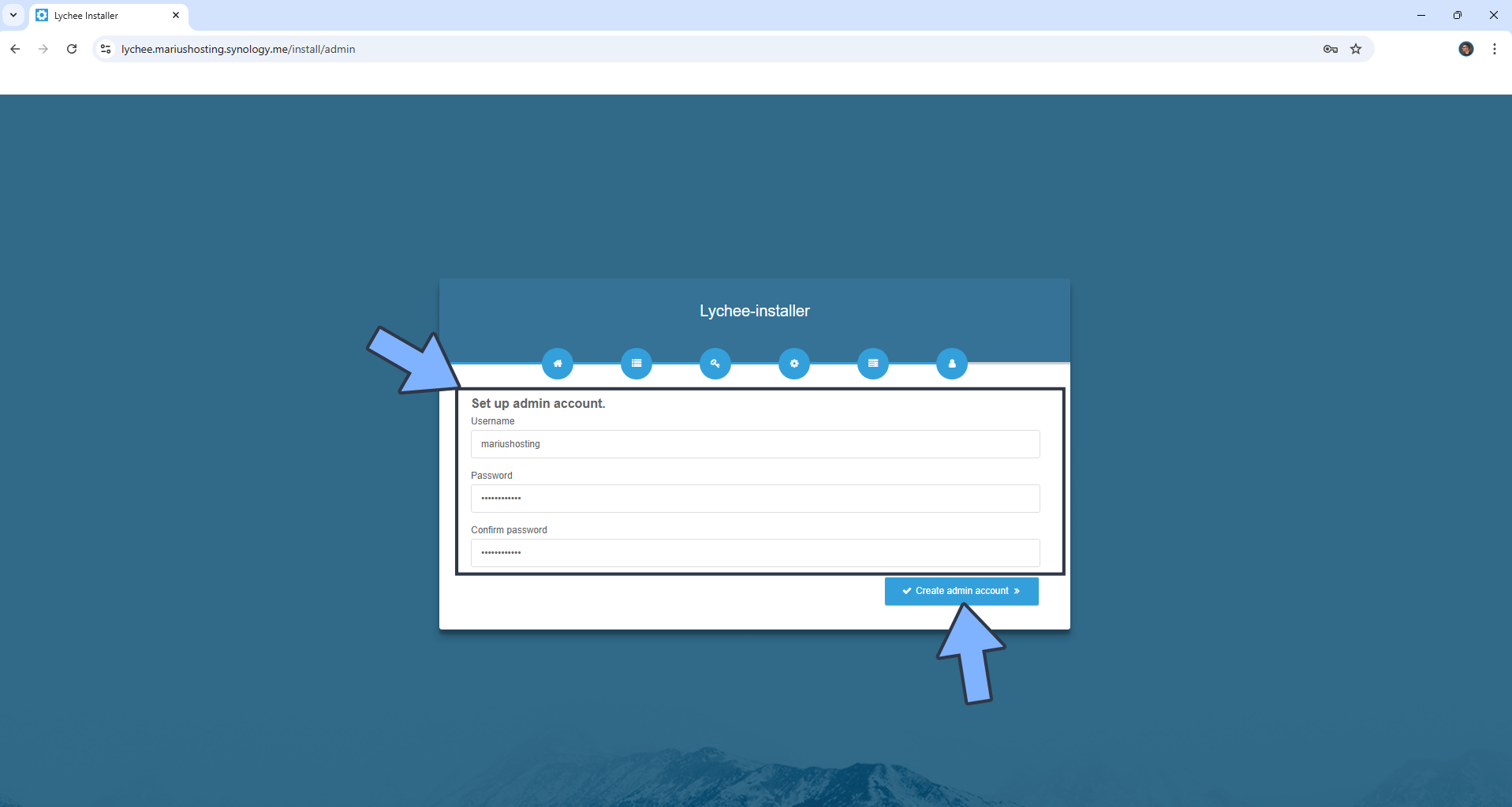
STEP 24
Click Open Lychee. Follow the instructions in the image below.
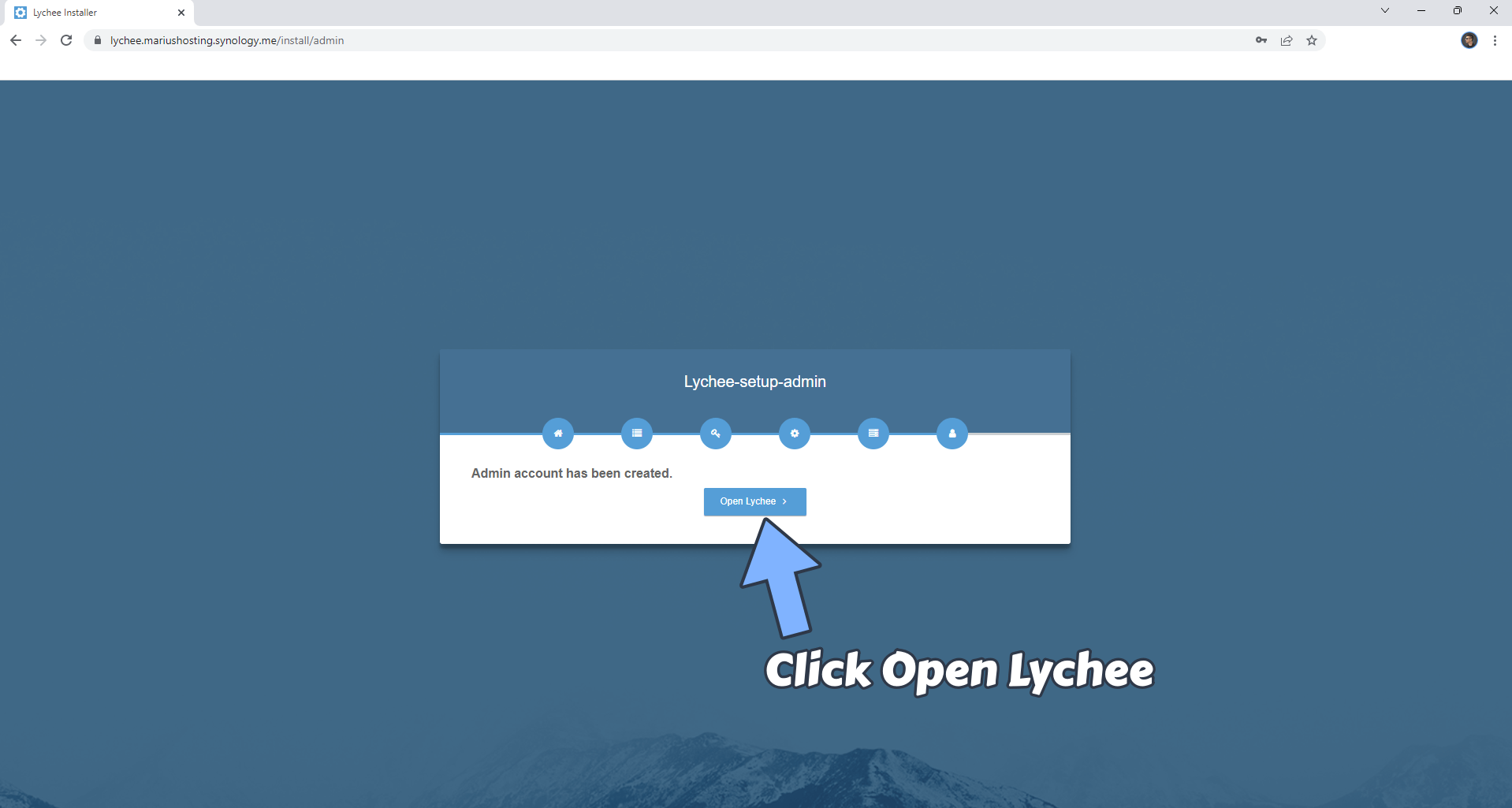
STEP 25
Type in the Username and Password that you have previously created at STEP 23. Click Sign In. Follow the instructions in the image below.
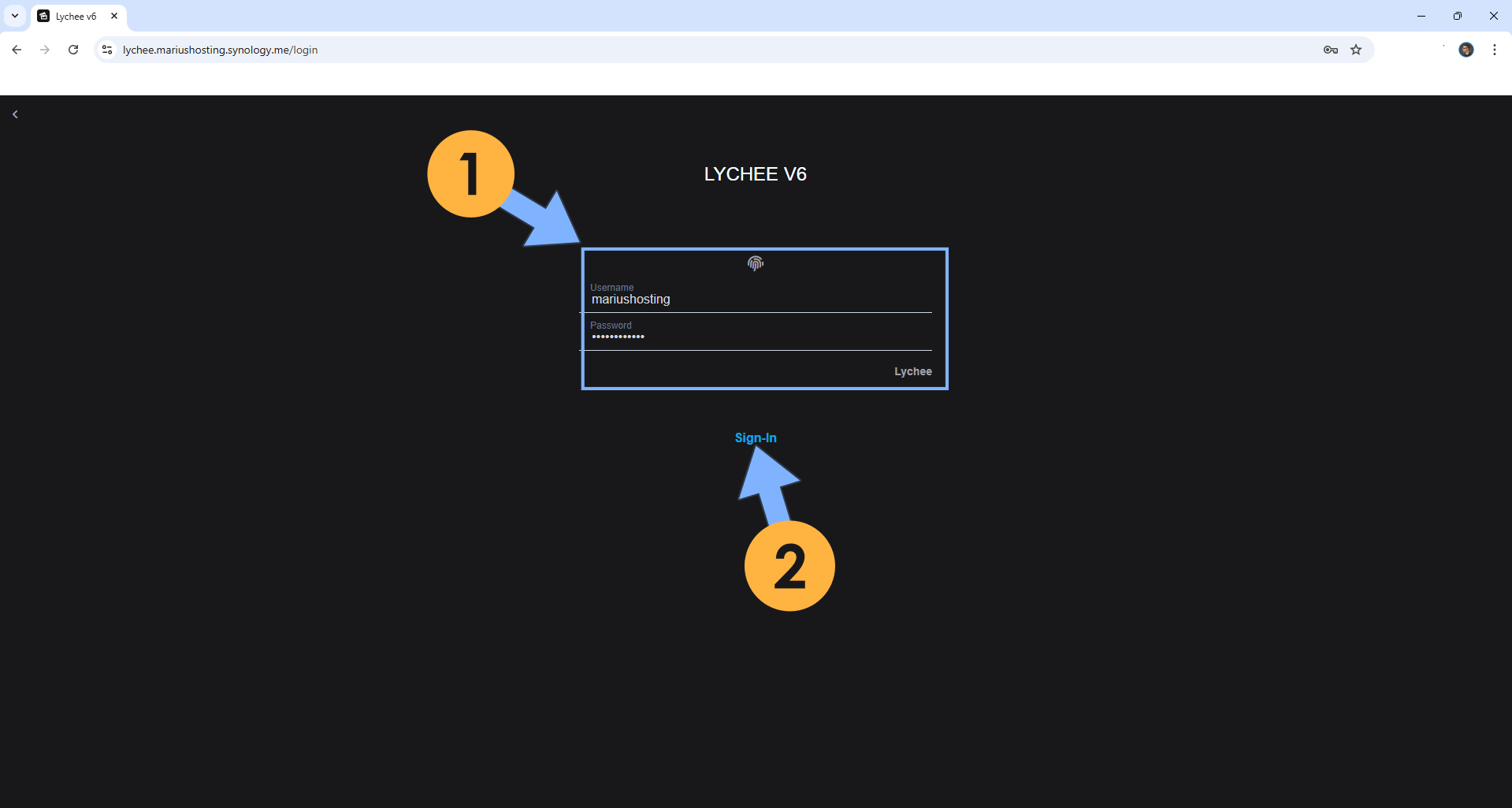
STEP 26
Close the pop-up window. Follow the instructions in the image below.
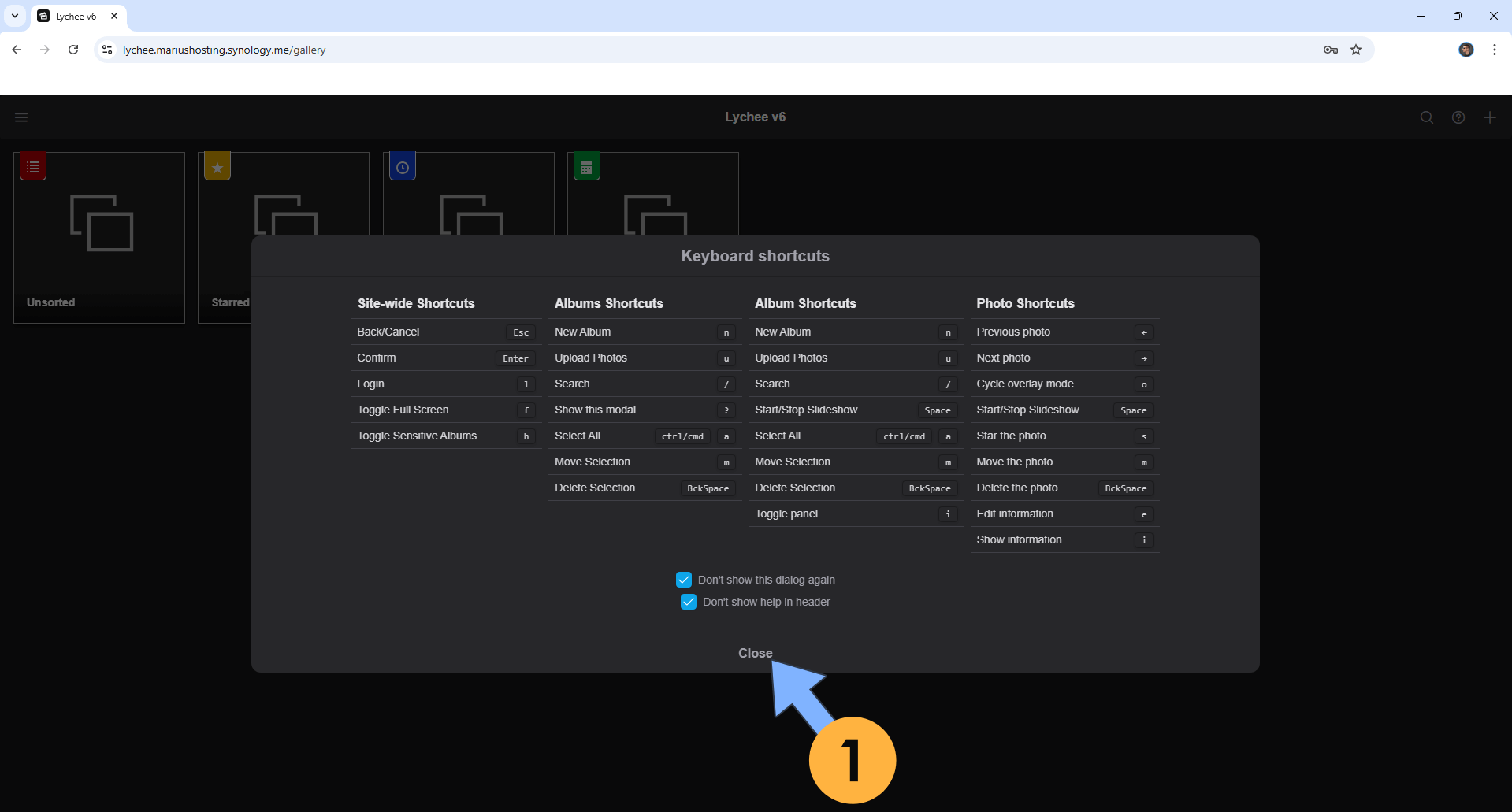
STEP 27
Your Lychee at a glance! Upload your own photos by clicking the + button at the top right of the page. Follow the instructions in the image below.
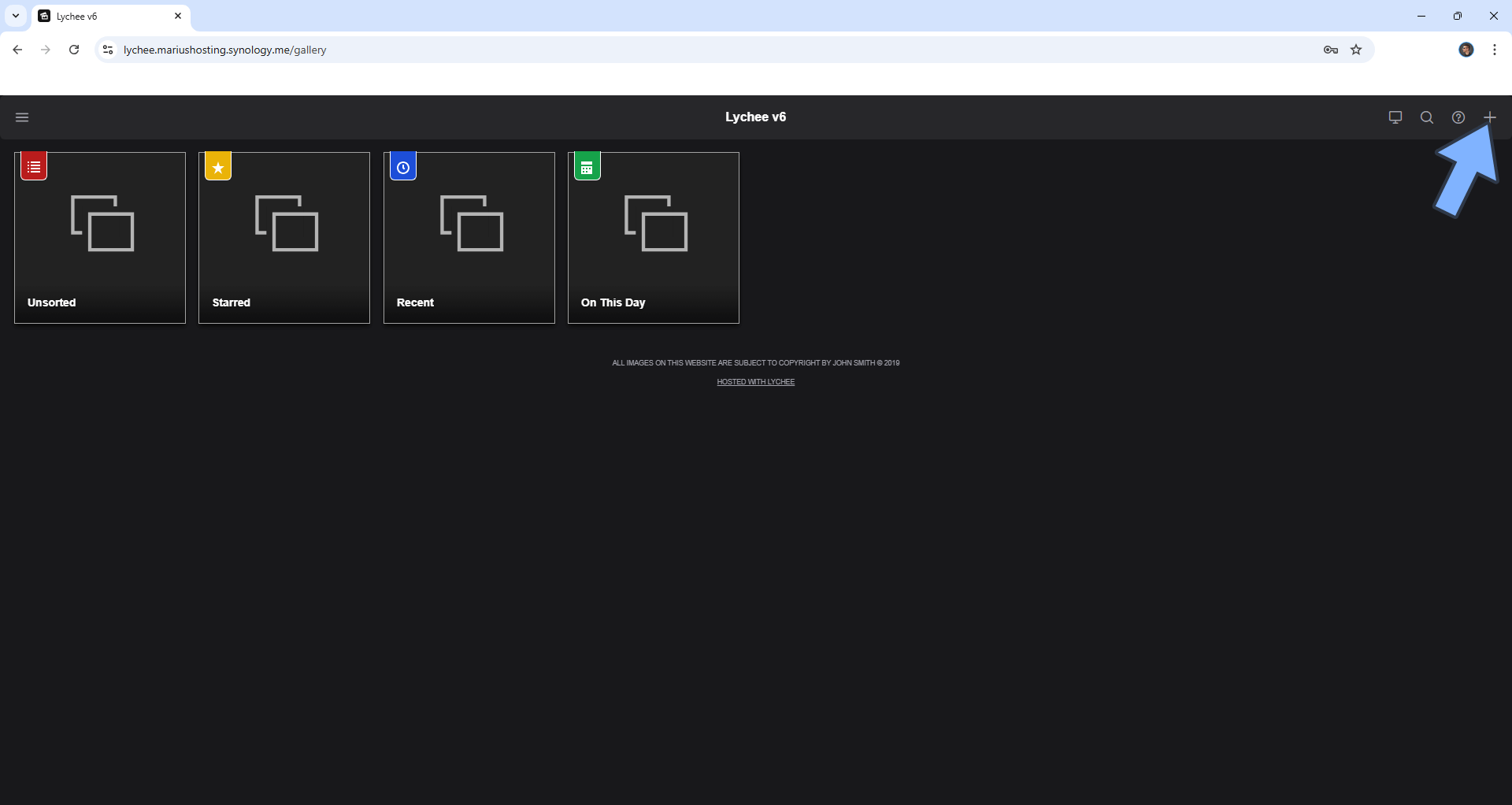
STEP 28
Your Lychee at a glance!
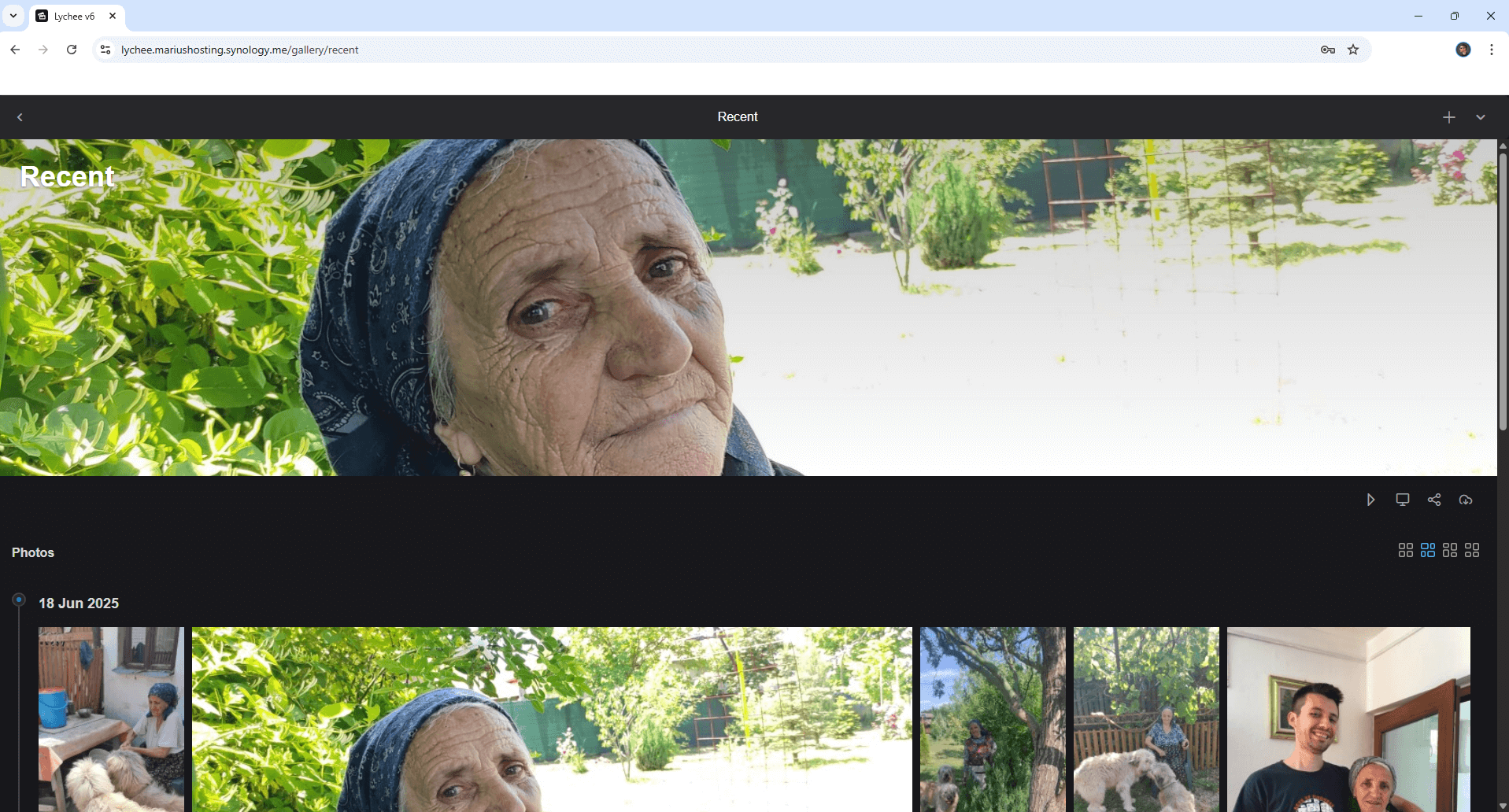
Enjoy Lychee!
Note: Lychee integrates a Honeypot and will return 418 if you hit some specific addresses. For example, if anyone tries to access the cross product of those e.g. admin.html, they will get a 418 back. You can then use that response with fail2ban to get rid of undesirable visitors: See more on the official Lychee page documentation.
If you encounter issues by using this container, make sure to check out the Common Docker issues article.
Note: Can I run Docker on my Synology NAS? See the supported models.
Note: How to Back Up Docker Containers on your Synology NAS.
Note: Find out how to update the Lychee container with the latest image.
Note: How to Free Disk Space on Your NAS if You Run Docker.
Note: Instead of the synology.me DDNS you can also use your own domain name.
Note: How to Schedule Start & Stop For Docker Containers.
Note: How to Activate Email Notifications.
Note: How to Add Access Control Profile on Your NAS.
Note: How to Change Docker Containers Restart Policy.
Note: How to Use Docker Containers With VPN.
Note: Convert Docker Run Into Docker Compose.
Note: How to Clean Docker.
Note: How to Clean Docker Automatically.
Note: Best Practices When Using Docker and DDNS.
Note: Some Docker Containers Need WebSocket.
Note: Find out the Best NAS Models For Docker.
Note: Activate Gmail SMTP For Docker Containers.
This post was updated on Thursday / July 3rd, 2025 at 4:32 PM
